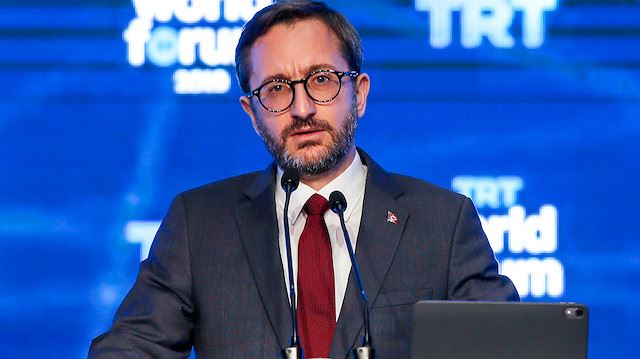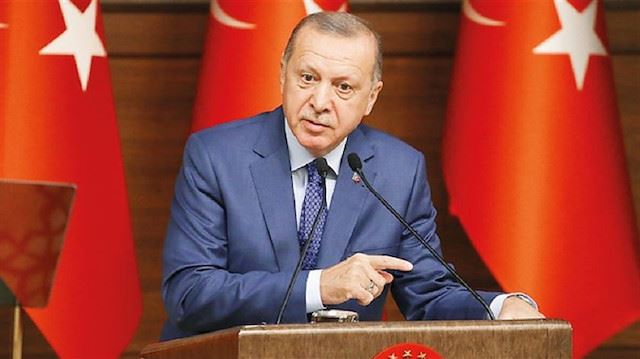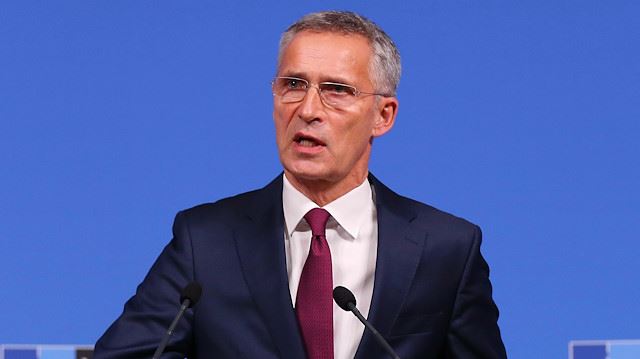NATO defense ministers will discuss deterrence and defense posture, Secretary-General Jens Stoltenberg said on Friday. "Today we will address NATO&rsq
NATO defense ministers will discuss deterrence and defense posture, Secretary-General Jens Stoltenberg said on Friday.
“Today we will address NATO’s deterrence and defense posture. Ensuring it remains fit for the future. To do so, we need to keep investing in defense.
“Allies have already delivered five consecutive years of real growth in defense budgets. This will be an additional $100 billion of national defense spending by the end of next year. But we need to keep up our efforts,” Stoltenberg said ahead of second day of NATO defense ministers meeting in Brussels.
Northeastern Syria dominates NATO meeting
NATO defense ministers discussed on Thursday wide range of issues, including the situation in northeastern Syria, Secretary General Jens Stoltenberg said.”There are different views among allies, and we had a frank and open discussion but we focused on the way forward,” Stoltenberg told reporters after the first day of meeting in Brussels.Stoltenberg said “significant” reductions in violence have been seen in northern Syria over the last week.”We agree we must build on this to make progress in our efforts to find a political solution to the conflict in Syria and we fully support UN-led efforts to reach a political solution,” he added.Sideline meetingsOn the sidelines of the meeting in Brussels, Turkish Defense Minister Hulusi Akar met with British Security Minister Ben Wallace. The ministers discussed security, bilateral relations, and defense industry cooperation.Akar also met his German counterpart Annegret Kramp-Karrenbauer. They exchanged views on defense and security.The defense ministers meeting will end on Friday.Top Erdoğan aide raps US treatment of terrorist sought by InterpolUS should hand YPG/PKK ringleader over to Turkey: President Erdoğan

Top Erdoğan aide raps US treatment of terrorist sought by Interpol
Turkey criticised the United States on Thursday for treating the commander of the Syrian Democratic Forces (SDF), which is made up of YPG terrorists, as a “legitimate political figure,” underlining continued tensions with Washington despite the end of its offensive in Syria.Republican and Democratic U.S. senators urged the State Department on Wednesday to quickly provide a visa to General Mazloum Kobani, so he can visit the United States to discuss the situation in Syria.Ankara views Mazloum as a terrorist closely linked to the Kurdistan Workers Party (PKK) terror group, which has waged a decades-long insurgency in Turkey.”We are deeply concerned about the treatment (of Mazloum)…. This individual is a senior leader of the PKK, which the United States and others consider a terrorist organization, and a fugitive from justice,” said Fahrettin Altun, director of communications for President Tayyip Erdogan.”He is the subject of an outstanding Interpol red notice. He is wanted for multiple terror attacks targeting the Turkish security forces, a NATO army, as well as civilians,” Altun told Reuters.EXTRADITIONTurkey will start paperwork for extradition of Kobani from Washington, Erdogan said.”Mazloum is a terrorist sought with a red notice. What does this mean? … The United States needs to hand over this man to us because he is wanted with a red notice,” Erdogan said in a broadcast interview.”I told my justice minister today. They will do necessary paperwork for request. They (the U.S.) need to give him to us.”
Stoltenberg said the ministers will also discuss the steps to improve the readiness of the forces including the NATO Readiness Initiative.
“We will also assess other ways enhancing our deterrence and defense, including improving our cyber defenses, and strengthening our maritime posture,” he added.
On the sidelines of the meeting, Turkish Defense Minister Hulusi Akar is expected to have bilateral talks with his counterparts.

US should hand YPG/PKK ringleader over to Turkey: President Erdoğan
YPG/PKK terrorist ringleader Ferhat Abdi Sahin, codenamed Mazloum Kobani, is wanted by Interpol and the U.S. should hand him over to Ankara, Turkey’s president said Thursday.”With the U.S., we have an extradition agreement. The U.S. should hand this man to us,” said Recep Tayyip Erdogan, adding he instructed his justice minister to take the necessary steps for Kobani’s extradition.Speaking live on Turkey’s state-run broadcaster TRT, Erdogan said the country has been harassed by terrorists in northern Syria for eight years.Erdogan underlined that some NATO countries armed the YPG/PKK terror group and that Germany, France and the U.S. met the leaders of the terrorist organization.”Russia urged Turkey to enter Syria’s Ayn al-Arab [Kobani], whereas the U.S. requested the opposite,” he said.”We will decide depending on the developments.”He went on to say that Turkey was awaiting the end of a 150-hour pause in its anti-terror operation in northern Syria — hammered out with Russia — before joint patrols with Moscow would commence.Critical of the U.S. administration’s failure to clear Manbij district in northwestern Syria of YPG/PKK terrorists within 90 days, he said no steps had been taken over the last year and a half.”To whom does Manbij belong? These terrorists?” Erdogan said, adding that up to 90% of the city’s population were Arabs forced to flee amid oppression by the terror group.He said a Turkish delegation would visit the U.S. on Nov. 13 to discuss recent developments in northern Syria, now-lifted U.S. sanctions on Turkey and bilateral ties.Reiterating that Turkey had no issues with Kurdish people, Erdogan said: “Kurds are our brothers. We do not have problems with them. We fight only terrorists.”Erdogan said Operation Peace Spring was named so due to the existence of large numbers of springs to the east of the Euphrates River in northern Syria.He reiterated that the international community had been informed about Turkey’s anti-terror operation east of the Euphrates.The Turkish leader went on to note that NATO Secretary-General Jens Stoltenberg and the international community including Germany, France, the U.K., Pakistan and Malaysia had been informed of Turkey’s counter-terrorism campaign in northern Syria.He stressed that Turkey could still hit terrorists beyond the safe zone, underlining that the country was acting on an anti-Daesh strategy in Syria.Asked whether Turkey would strike YPG/PKK elements in northern Syria if they did not withdraw, he responded that the Turkish military would act accordingly if diplomatic efforts did not bear any fruit.Stressing that Turkish forces fought Daesh terrorists on the ground, Erdogan said over 3,000 members of the terrorist group had been neutralized by Turkish forces.Erdogan said seven members of the Turkish army were martyred amid the clashes in northern Syria and 95 were wounded, while 96 were martyred from the Syrian National Army with 374 others wounded. He added that 20 civilians were martyred and 187 wounded during the operation.Expressing his condolences to those who lost their lives and wishing a speedy recovery for the wounded, Erdogan said that solidarity between Turkey, Russia and Iran had prevented “bloodshed” in Syria’s northwestern town of Idlib.He said the YPG/PKK terror group’s heavy weaponry should be handed over to NATO-member Turkey.Hailing the country’s growing defense industry, Erdogan said Turkey’s nationally built armed drones provided much “relief” in the anti-terror operation.He urged the “civilized world” to back Turkey and its operation.”Turkey needs international support for the settling of refugees,” Erdogan said, adding Ankara planned to build hospitals and schools in a northern Syria safe zone — one of the operation’s primary aims — as well as ensure the voluntary return of refugees to the area.He slammed the Arab League’s stance on Operation Peace Spring, adding the bloc had not helped Turkey in sheltering millions of Arabs.”The Arab League was unable to resolve any issue in the Muslim world,” he said.On Oct. 9, Turkey launched Operation Peace Spring to eliminate terrorists from northern Syria east of the Euphrates River in order to secure Turkey’s borders, aid in the safe return of Syrian refugees and ensure Syria’s territorial integrity.On Oct. 22, Erdogan and his Russian counterpart Vladimir Putin held a meeting in Russia’s Black Sea resort town of Sochi.Ankara and Moscow reached a deal under which YPG/PKK terrorists will pull back 30 kilometers (18.6 miles) south of Turkey’s border with northern Syria within 150 hours and security forces from Turkey and Russia will conduct joint patrols there.In its more than 30-year terror campaign against Turkey, the PKK — listed as a terrorist organization by Turkey, the U.S. and the European Union — has been responsible for the deaths of 40,000 people, including women, children and infants. The YPG is the Syrian offshoot of the PKK.Touching on inflation and investment in Turkey, Erdogan said inflation will drop significantly in the country once interest rates reach single digits, and as a result, investments in Turkey will increase.Following a drop in interest rates, sales in the automotive sector have started to increase again, he said, adding home sales have also begun to increase, and “I believe they will increase more.”
